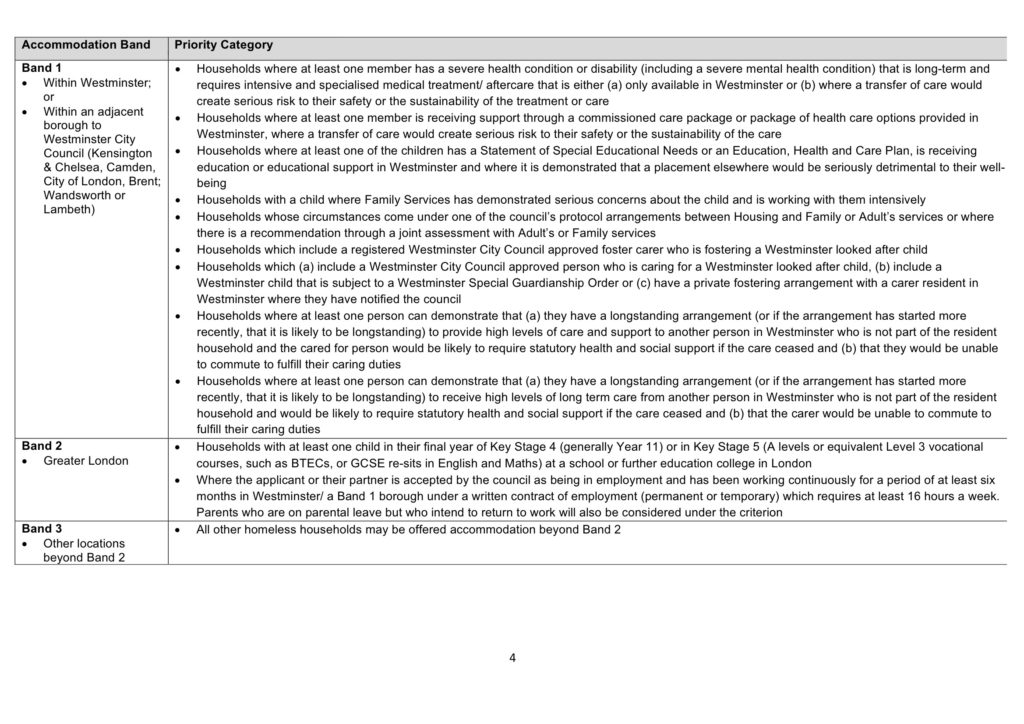As has been reported here and here, Westminster City Council have decided to adopt various new housing policies. In particular, there are new proposed policies on temporary accommodation and permanent accommodation offers for homeless households. The documents can be found here.
The new ‘policy framework’ will mean the following:
For both temporary accommodation AND private sector offers for discharge of duty
All properties provided for use as s.193 temporary accommodation or private rented sector offers are banded in the following areas:
• Band 1: Westminster and the Local Area
o Within Westminster; or
o Within an adjacent borough to Westminster City Council (Kensington & Chelsea, Camden, City of London, Brent, Wandsworth or Lambeth)
• Band 2: Greater London (within a London Borough)
• Band 3: Other Areas Beyond Band 2
The banding criteria are set out in this image (at the top of the email, if reading by email):
What this effectively amounts to is a policy that any household without a significant care or vulnerability need to remain in central London, or children in school at key exam stages or applicant/partner working in central London for the last six months (Greater London band) will be presumed to be shipped out of London, both for temporary and permanent PRS accommodation.
By appendix 2, Private Sector discharge offers will in principle be made to every homeless household except
a. Households eligible for Community Supportive Housing (sometimes known as sheltered housing) – as it is unlikely that this type of housing can be provided in the private rented sector.
b. Households that need wheelchair adapted properties – as these can be hard to procure in the private rented sector.
c. Any household which the council determines would be unable to manage a private rented sector tenancy.
2.4 Exceptions may also be made for other households in respect of whom there is a compelling reason why a PRSO would not be appropriate. A decision will be taken after a consideration of each household’s individual circumstances.
So, virtually everybody.
Westminster say the key to their accommodation procurement policy is “affordability”.
The affordability of properties will be a key factor when procuring properties. Properties should be cost neutral to the council and within allowable subsidy rates or benefit levels in order to meet budgetary targets. Over the past two years, temporary accommodation has cost the council £4 – £5m per annum as it has not been possible to procure properties within the subsidy rate.
What affordability will mean in practice is clear in Appendix 3 – as the following images set out (here and here for those reading on email)
The upshot? Watch out Coventry, Birmingham and Leicester. Westminster is coming… Both for temporary accommodation and for permanent PRS offers.
In Greater London and indeed inside the South East, from Gravesend to Slough, “properties may not be affordable to households affected by the overall benefit cap where they are occupied by more than 2 adults and 1 child”.
How this will go, we will have to see. It looks, at first blush, like a general presumption of ‘out of London’ for both temporary accommodation and private sector discharges, with specified exceptions. There is, as we have noted before, a serious tension between a consideration of suitability of accommodation in the specific circumstances of a household’s needs, as required by statute, and the application of a policy framework – let alone a banding framework – based upon set criteria. In addition, using ‘affordability’ as the primary, indeed virtually sole determinant of location of offer runs rather roughshod over the Supreme Court view in Nzolameso.
At first sight, I would anticipate a challenge to Westminster’s new policy, and we will have to see how that goes.
And then, in a rather desperate attempt to apply ‘nudge’ theory, Westminster propose to rename their non-renewable flexible secure tenancies to ‘Flexible Tenancies for Non Priority Households’, just in case anyone got any ideas that they might be allowed to stay.



0 Comments